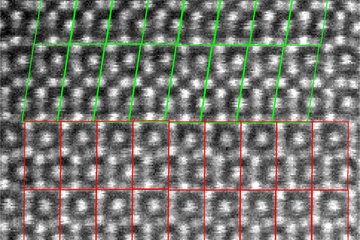All genres
1.
Journal Article
Mechanisms of grain boundary a precipitation in the metastable b-titanium Ti–5Al–5Mo–5V–3Cr. Acta Materialia 272, 119955 (2024)
2.
Journal Article
Hydrogen-promoted heterogeneous plastic strain and associated hardening effect in polycrystalline nickel under uniaxial tension. Materials Science and Engineering A: Structural Materials Properties Microstructure and Processing 894, 146190 (2024)
3.
Journal Article
Boron trapping at dislocations in an additively manufactured polycrystalline superalloy. Materialia 30, 101801 (2023)
4.
Journal Article
Phase transformations in the alumina-forming austenitic stainless-steel Fe–20Cr–30Ni–2Nb–5Al during creep at 750oC 45 MPa. Materialia 30, 101849 (2023)
5.
Journal Article
Microstructural evolution and creep mechanism of a directionally solidified superalloy DZ125 under thermal cycling creep. Journal of Alloys and Compounds 947, 169533 (2023)
6.
Journal Article
Synergistic enhancement of high temperature strength and ductility with a novel g/e dual-phase hetero-nanostructure in NiCoCr-based alloys. Materials Science and Engineering A: Structural Materials Properties Microstructure and Processing 877, 145142 (2023)
7.
Journal Article
Data-driven “cross-component” design and optimization of γ′-strengthened Co-based superalloys. Advanced Engineering Materials 25 (10), 2201257 (2023)
8.
Journal Article
Precipitate formation in the Fe–Al–Nb and Fe–Al–Ta systems. Scripta Materialia 226, 115220 (2023)
9.
Journal Article
Simultaneously enhancing strength-ductility synergy and strain hardenability via Si-alloying in medium-Al FeMnAlC lightweight steels. Acta Materialia 245, 118611 (2023)
10.
Journal Article
g'-Strengthened Multicomponent CoNi-Based Wrought Superalloys with Improved Comprehensive Properties. Metallurgical and Materials Transactions A 54 (5), pp. 1671 - 1682 (2023)
11.
Journal Article
Transmission Kikuchi Diffraction Mapping Induces Structural Damage in Atom Probe Specimens. Microscopy and Microanalysis 29 (3), pp. 1026 - 1036 (2023)
12.
Journal Article
Near-Atomic-Scale Evolution of the Surface Chemistry in Li[Ni,Mn,Co]O2 Cathode for Li-Ion Batteries Stored in Air. Advanced Energy and Sustainability Research 4 (1), 2200121 (2023)
13.
Journal Article
Hydriding of titanium: Recent trends and perspectives in advanced characterization and multiscale modeling. Current Opinion in Solid State and Materials Science 26, 101020 (2022)
14.
Journal Article
Alleviating the strength-ductility trade-off dilemma in high manganese steels after hydrogen charging by adjusting the gradient distribution of twins. Corrosion Science 207, 110579 (2022)
15.
Journal Article
Optimizing mechanical properties of 15Cr supermartensitic stainless steel by enhanced stability of retained austenite. Materials Science and Engineering A: Structural Materials Properties Microstructure and Processing 853, 143732 (2022)
16.
Journal Article
Unveiling the Re effect on long-term coarsening behaviors of γ′ precipitates in Ni-based single crystal superalloys. Acta Materialia 233, 117979 (2022)
17.
Journal Article
Origin of morphological variation of grain boundary precipitates in titanium alloys. Scripta Materialia 214, 114651 (2022)
18.
Journal Article
In-situ synchrotron-based high energy X-ray diffraction study of the deformation mechanism of δ-hydrides in a commercially pure titanium. Scripta Materialia 213, 114608 (2022)
19.
Journal Article
The role of β pockets resulting from Fe impurities in hydride formation in titanium. Scripta Materialia 213, 114640 (2022)
20.
Journal Article
Thermal cycling creep properties of a directionally solidified superalloy DZ125. Journal of Materials Science & Technology 104, pp. 269 - 284 (2022)











